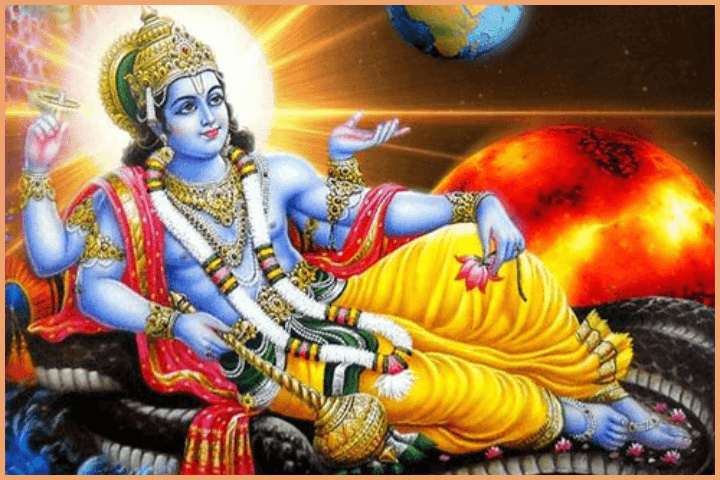Lord Vishnu, the guardian and sustainer of the universe, plays a vital role in Hinduism. His divine energy sustains the cosmos, and his countless names reflect his multifaceted nature. Each of these Lord Vishnu names carries deep spiritual significance, offering devotees a way to connect with his divine essence. Whether you are seeking inspiration for naming a child, exploring Hindu traditions, or deepening your spiritual practice, these names provide a gateway to understanding Vishnu’s greatness.
The Power of Names in Hinduism

In Hinduism, names are more than mere labels; they embody vibrations filled with energy and significance. The names of Lord Vishnu is no exception. Each name encapsulates a unique aspect of his divine personality, from his role as the protector of dharma to his boundless compassion for devotees. Chanting or meditating on these names can bring peace, prosperity, and spiritual growth.
50 Sacred Lord Vishnu Names and Their Meanings
Here is a curated list of 50 Lord Vishnu names, each with its meaning and significance:
- Aadhavan: “As brilliant as the sun” – Symbolizes radiance and vitality.
- Achyut: “Imperishable” – Reflects Vishnu’s eternal nature.
- Anant: “Endless” – Represents his infinite presence.
- Govind: “Protector of cows” – Highlights his nurturing role.
- Madhusudan: “Destroyer of the demon Madhu” – Signifies his power to vanquish evil.
- Narayana: “Refuge of man” – Emphasizes his role as a protector.
- Padmanabha: “Lotus-naveled” – Symbolizes the source of creation.
- Trivikram: “One who covers the universe in three steps” – Celebrates his cosmic greatness.
- Vamana: “The dwarf incarnation” – Represents humility and strength.
- Keshav: “One with beautiful hair” – Associated with his divine beauty.
- Damodara: “One with a rope around his belly” – Reflects his playful and loving nature.
- Hari: “The remover of sins” – Symbolizes compassion and liberation.
- Jagadish: “Lord of the universe” – Highlights his supreme authority.
- Mukund: “The giver of freedom” – Represents liberation (moksha).
- Sridhar: “The bearer of wealth” – Symbolizes prosperity and abundance.
- Rishikesh: “Lord of the senses” – Signifies control over human desires.
- Vasudeva: “Son of Vasudeva” – Associated with Lord Krishna.
- Janardhana: “The one who bestows happiness” – Reflects his role in bringing joy.
- Upendra: “The younger brother of Indra” – Linked to his Vamana avatar.
- Vishwambhar: “The sustainer of the universe” – Emphasizes his role as the preserver.
- Lokesh: “Lord of the world” – Highlights his dominion over the three realms.
- Shrestha: “The most glorious” – Celebrates his unparalleled greatness.
- Vikram: “Valorous” – Symbolizes strength and determination.
- Yajnesh: “Lord of sacrifices” – Reflects his connection to rituals.
- Dattatreya: “Incarnation as the sage Dattatreya” – Embodies wisdom and selflessness.
- Hrishikesh: “Lord of the senses” – Signifies guidance over human emotions.
- Pradyumna: “The mighty one” – Represents love and devotion.
- Sankarshan: “The one who attracts all” – Symbolizes spiritual enlightenment.
- Purushottam: “The Supreme Being” – Highlights his unparalleled divinity.
- Vishvaksena: “Commander of the universal army” – Represents protection of dharma.
- Adhoksaja: “Beyond the senses” – Signifies his transcendental nature.
- Paramatma: “The Supreme Soul” – Reflects his role as the ultimate source.
- Narasimha: “The man-lion” – Associated with his fierce incarnation.
- Krishna: “The all-attractive” – Embodies love, wisdom, and divine play.
- Balaji: “Form of Venkateswara” – Symbolizes grace and blessings.
- Venkatesh: “Lord of Venkata Hill” – Represents protection and benefaction.
- Hayagriva: “The horse-headed one” – Embodies knowledge and wisdom.
- Dhananjaya: “The conqueror of wealth” – Symbolizes prosperity and success.
- Chakrapani: “The one who holds the chakra” – Represents the destruction of evil.
- Gadadhara: “The wielder of the mace” – Highlights his strength and justice.
- Shantatma: “The peaceful soul” – Reflects his calm and composed nature.
- Vishwam: “The universe” – Signifies his all-encompassing presence.
- Amritaya: “The immortal one” – Represents his eternal nature.
- Bhagavan: “The Supreme Lord” – A universal title for Vishnu.
- Karanodakshayi Vishnu: “Creator of the cosmic ocean” – Symbolizes the source of life.
- Aniruddha: “Uncontrolled” – Represents his boundless energy.
- Akshar: “Everlasting” – Reflects his immortal essence.
- Bhagirath: “One who brings the Ganges to earth” – Symbolizes purity and devotion.
- Dharmadhyaksha: “The overseer of dharma” – Represents his role in maintaining righteousness.
- Vishodhan: “The purifier” – Signifies his ability to cleanse sins.
The Spiritual Significance of Chanting Vishnu’s Names
Chanting the names of Lord Vishnu is a powerful spiritual practice. It is believed to:
- Remove negative karma and sins.
- Bring peace and mental clarity.
- Protect against evil forces.
- Attract prosperity and success.
- Deepen one’s connection with the divine.
For maximum benefit, devotees often chant these names on auspicious days like Ekadashi, Purnima, or during sacred months like Kartik and Vaishakha. Lighting a diya (lamp) with desi ghee before an idol of Lord Vishnu while chanting his name enhances the spiritual experience.
How to Incorporate Vishnu’s Names into Daily Life
- Morning Rituals: Start your day by chanting a few names of Lord Vishnu during your morning meditation or prayers.
- Naming Ceremonies: Choose a meaningful name from Vishnu’s list for your child to invoke his blessings.
- Japa Meditation: Use a mala (prayer beads) to chant Vishnu’s names 108 times for spiritual focus.
- Festive Celebrations: Recite Vishnu’s name during festivals like Janmashtami or Diwali to honor his presence.
- Home Decor: Display Vishnu’s names or symbols in your home to create a sacred and peaceful environment.
Embracing the Divine Through Vishnu’s Names
The names of Lord Vishnu are more than just words; they are a bridge to the divine. Each name carries a unique vibration that connects devotees to Vishnu’s boundless energy and grace. By understanding, chanting, or naming children after these sacred names, we can align ourselves with his virtues of compassion, strength, and wisdom.
Whether you are seeking spiritual growth, protection, or simply a deeper connection with the divine, these names offer a timeless way to honor Lord Vishnu and invite his blessings into your life. Let the divine essence of Vishnu guide you on your journey, filling your heart with peace, purpose, and divine love.

